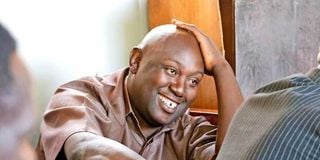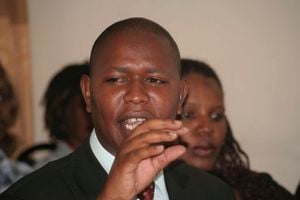I’m still a police officer, declares Waiganjo

Joshua Waiganjo in a Nakuru court in this past photo. PHOTO | FILE | NMG
What you need to know:
- Last month, he was acquitted of two counts of violent robbery and impersonating a police officer
- Mr Waiganjo says he came to learn later that the other officers, including the DCIO, had colluded to fix him.
- “I was shocked to learn that whereas I recorded what had taken us to Baragoi, some of the officers we were with decided to fix me. They wanted me arrested because they felt I had more powers,” he said.
For more than 10 years, he served as a police reservist employed by the National Police Service.
Mr Joshua Karianjahi Waiganjo, while working as an officer, performed his duties as expected, made friends in the police service and enjoyed equal rights and privileges with his colleagues.
This was until 2012, when he was arrested for allegedly being a criminal masquerading as a senior police officer while engaging in a spate of robbery with violence among other crimes.
During his eight-year trial, he was shamed, ridiculed publicly and condemned to prison for being assumed to be a hardcore criminal.
Mr Waiganjo is now a free man after a court cleared him of all six counts of crime, including impersonation, robbery with violence and theft.
His freedom came in May when the court acquitted him alongside his co-accused - former Rift Valley provincial police boss John M’mbijiwe and the Anti-Stock Theft Unit commander Remi Ngugi, who were charged with abuse of office.
His acquittal surprised many Kenyans, who were left puzzled about the identity of the ‘civilian’ who managed to get his way into the inner circles of a highly guarded police force and later to be in charge of other officers.
Not even the judicial process could help unravel the truth behind the recruitment and operations of Mr Waiganjo. One month after his acquittal, Mr Waiganjo has come out to tell his side of the story, negating the falsehoods that had been peddled against him.
“I’m a victim of the infighting within the police service,” he began.
“I was made the sacrificial lamb through the false allegations against me over the deaths of 40 police officers in Baragoi.”
Mr Waiganjo said he was and is still a police officer who was legally appointed through a rigorous competitive process. He says that someone in the police force was jealous of him and decided to bring him down when they got an opportunity.
While recounting the events that culminated in his arrest on December 30, 2012, Mr Waiganjo says his troubles began earlier in the year when he fell into trouble with his fellow officers.
He says he had learnt that the then regional Directorate of Criminal Investigations officer (DCIO)had made complaints against him to his boss, Mr John M’mbijiwe.
He says Mr M’mbijiwe, who had only been in the office for four months, asked the DCIO to take him to court if he had any evidence to show that he was involved in any crime.
However, his goose was cooked during the trip to Baragoi, where he had attended a security meeting that was meant to find a solution to the rampant cattle rustling that had rocked the region.
During the trip, he accompanied Mr M’mbijiwe, Mr Ngugi, the regional DCIO, and the Njoro OCPD at the time, Mr Peter Njeru, in a police chopper. It was just two weeks after their trip when the ambush attack on police officers was reported where the 40 policemen were killed.
Mr Waiganjo says the attack sent shock waves across the police ranks following the public condemnation over police inefficiencies.
The police commissioner at the time, Mr Mathew Iteere, formed a commission of inquiry to investigate what had transpired.
Mr Waiganjo says he came to learn later that the other officers, including the DCIO, had colluded to fix him.
“I was shocked to learn that whereas I recorded what had taken us to Baragoi, some of the officers we were with decided to fix me. They wanted me arrested because they felt I had more powers,” he said.
Mr Waiganjo said he started hearing rumours that he was being investigated. He said a colleague told him while he was in Uganda that things were not good back at home. That’s when he decided to travel back home.
He was shocked when he was arrested in Eldama Ravine by police detectives while on his way back home. He was taken to the Naivasha Police Station and locked up as police claimed they were conducting investigations.
While at the police station, Mr Waiganjo said he overheard a phone conversation between the regional DCIO and Naivasha DCIO Martin Imbaya.
Mr Waiganjo says the regional boss was telling Mr Imbaya to find any serious charge that could get him charged in court.
He reported that during his detention in the cells in Naivasha, Mr Imbaya instructed his officers to conduct a search in his houses in Njoro and Gilgil.
“They took my police uniforms, confiscated my documents and detained my three lorries and my father’s car,” he said.
He was produced in court in Naivash on January 2, 2013 where he was charged with two separate counts of robbery with violence, impersonating a police officer and wearing and being in possession of police uniforms.
He was also charged with stealing in a court in Nakuru. He denied all charges.
Later in 2014, the chairman of the Independent Policing Oversight Commission, Mr Johnstone Kavuludi, recommended the interdiction and prosecution of Mr M’mbijiwe and Mr Ngugi for allegedly abusing their office in covering Mr Waiganjo as he masqueraded as as a police officer.
Mr Waiganjo was also charged alongside the police bosses.
He was found guilty of impersonation after his appointment letter disappeared from the court file, and he was thrown into the Naivasha Maximum Security Prison to serve five years.
He successfully appealed the sentence and High Court Judge Christine Meoli ordered a retrial in 2017.
The investigating officer in the case later withdrew it, saying he could not find witnesses and exhibits.
“Being thrown into prison for a crime I did not commit was the most painful period of my life,” Mr Waiganjo says.
Another case in which he was accused of stealing a motor vehicle in Nakuru was also dismissed in 2018 for lack of evidence.
He was now left battling the abuse-of-office case alongside Mr M’mbijiwe and Mr Ngugi in which detectives failed to testify, leading to their acquittal.
Mr Waiganjo is, however, bitter with the police bosses, who he says failed in their mandate to protect his rights. He has since written to the officers informing them of his intention to sue for damages.
Contacted for comment, Mr Imbaya, now the county criminal Iinvestigations officer in Meru, declined to speak on the issue, only saying that he was discharging his mandate.
“I have nothing to comment about the matter. Let Waiganjo say whatever he wishes, what I know is that I was discharging my duty,” he said.
Mr Kavuludi claimed he was in a meeting and did not respond to our text message.





